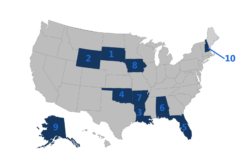Deployment can be difficult for service members and military families. However, one perk of deployment is the extra money. Service members can build up their savings account when they are deployed. This can be true, but the cost of deployments can be more than emotional.

In the “ideal” deployment (if such a situation exists), a married service member who deploys to a combat zone will see a significant increase in their paycheck. There is hazardous duty pay, hardship pay, imminent danger pay and a bonus for being geographically separated from your spouse that kicks in after the first 30 days apart.
In addition, combat pay is tax-exempt, so the service member will have a very low income reported on their W-2 after a deployment year. This can translate into a tax refund of thousands of dollars.
However, not all deployments will place the service member in this high-income/low-tax scenario. In fact, during some deployments, service members will see their paychecks decrease and their overall bills increase. How can that happen?
Marriage Affects the Cost of Deployments
During his first few deployments, my husband was not married. We were dating but had separate finances. I had my job, car and apartment. When he deployed, he had absolutely no bills for seven months. All his income, including the hazardous duty pay, accumulated in his bank account during deployment. He returned home to a very nice nest egg for a 20-year-old.
Then we married and had children.
His next two deployments were also to combat zones. We were married, so he was eligible for geographic separation pay. He expected to come home to a sturdy savings account. But now he was supporting a family. He had a mortgage to pay and diapers to buy. I had left my job to move to his base and stay home with our children, so we relied solely on his income. I saved where I could during his deployments, but there were unavoidable expenses: car repairs, a computer crash and maintenance on our home. When he returned home, there was not much of a nest egg waiting for him. It was a frustrating time for both of us.
Noncombat Deployments Equals Less Income
His two most recent deployments have actually reduced his overall paychecks. He still received geographic separation pay, but because they were noncombat deployments, there was no additional hazardous duty or hardship pay. Also, because he was either on a ship or an overseas military base with a chow hall, he no longer received basic allowance for subsistence (BAS) to cover his food. Even though geographic separation pay was added, subtracting BAS from the paycheck reduced his typical pay by at least $50 per month. While this is not a terrible hardship, it was important to know when preparing our family’s deployment budget.
An additional income adjustment to consider was taxes. When the entire deployment is spent in noncombat zones, there will be no tax-free income. The service member’s entire paycheck will be reported on their W-2. This may put the family into a higher tax bracket and affect whether they qualify for the earned income credit. A noncombat deployment is less likely to give you a tax refund than a combat deployment.
Extra Bills Contribute to the Cost of Deployment
During previous deployments, I saved money by suspending my service member’s cellphone plan, reducing our cellphone data package and canceling subscriptions to his gaming programs, sports and cable channels. Since my husband had very limited internet access during most deployments, it made sense to save that money while he was gone. Getting a military discount on your cellphone plan can also help if you do not already have that activated.
However, his recent deployment was to a location with an established military base that offered Wi-Fi in the barracks. Service members could pay $50/month to have internet access in their rooms. Some families chose to pay for an international cellphone plan. We learned that this was only an extra $5 per month for Sprint but could be $50 per month from Verizon, adding to the cost of deployment.
Then there are recreational expenses. Some overseas bases grant weekend liberty (libbo), which allows service members to leave the base and be tourists — enjoying local food, entertainment or experiences like scuba diving. These excursions are paid for out-of-pocket.
Navy service members and Marines deployed on ships are allowed to rent hotel rooms during port calls. These must be in approved Department of Defense facilities, which are usually Five-star hotel chains. That $200 per room per night is a lot of money to factor into a deployment budget. My husband opted not to stay in hotels, but those who did often racked up high bills for room service, drinks or restaurant meals.
Your Deployment Budget
Even if your service member has deployed before, a military family must recalculate its budget for every deployment. Will it be to a noncombat or hazardous zone? Will they lose BAS? Can the family save money by cutting down household expenses? Will the service member need to budget for internet access, hotel rooms or occasional tourist activities? A couple should work together to answer these questions and balance their household budget before deployment begins.
How has deployment affected your household budget?




Comments:
About the comments on this site:
These responses are not provided or commissioned by the bank advertiser. Responses have not been reviewed, approved or otherwise endorsed by the bank advertiser. It is not the bank advertiser’s responsibility to ensure all posts and/or questions are answered.
Peter Goble says
Why would a deploying Army reservist be told to take $8000 in cash to support themselves while deployed in a combat zone?
Ryan Guina says
Peter, I’ve never heard of this. All military members are required to have direct deposit set up for their military pay. They should have access to this through their normal banking channels. It is recommended that each military member have access to online banking through a computer or their mobile phone. Most deployed locations have access to the Internet and wifi, so the service members should be able to access their paychecks.